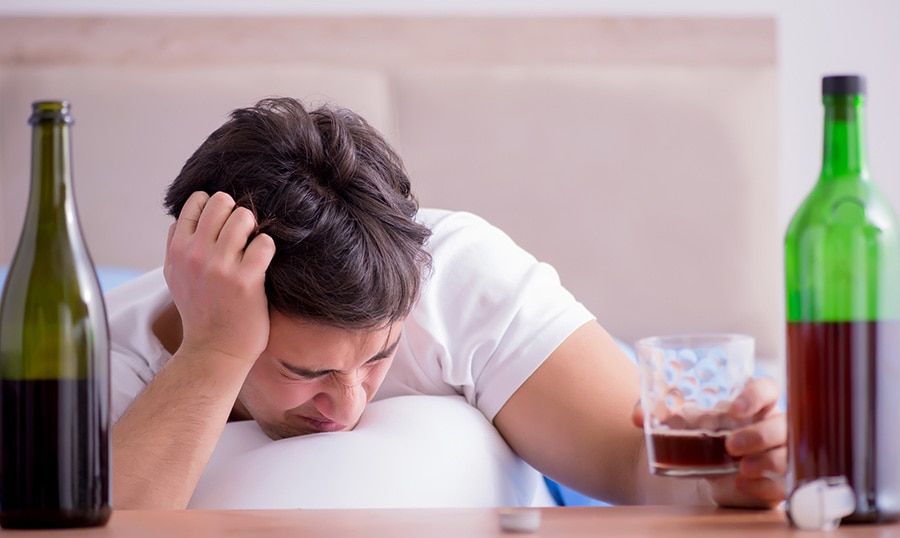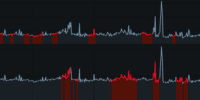Why Alcohol and Sleep Don’t Mix Well

Alcohol consumption has long been recognized as a prevalent behavior within society, albeit with various consequences.
Of particular interest is the impact of alcohol on sleep, a vital physiological process that is crucial for maintaining overall health and well-being.
This article aims to explore the negative effects of alcohol on sleep quality and its implications for sleep architecture, duration, and various sleep disorders.
By examining the relationship between alcohol consumption and sleep, this study seeks to shed light on the detrimental consequences that arise when alcohol and sleep intertwine.
Key Takeaways
- Alcohol decreases sleep latency and increases the number of awakenings during the night, leading to fragmented and restless sleep.
- Alcohol disrupts sleep architecture, reducing the overall duration of deep sleep and REM sleep, impairing memory consolidation, creativity, and emotional stability.
- Alcohol prevents individuals from reaching deeper, more restorative stages of sleep, resulting in individuals feeling tired and unrefreshed upon waking.
- Alcohol consumption significantly reduces REM sleep, impairing memory consolidation, learning abilities, attention span, problem-solving skills, and decision-making abilities.
Negative Effects of Alcohol on Sleep Quality
The consumption of alcohol has been found to have a detrimental impact on the quality of sleep. One aspect of sleep quality affected by alcohol consumption is sleep latency, which refers to the time it takes for an individual to fall asleep. Research has shown that alcohol can decrease sleep latency, causing individuals to fall asleep more quickly.
However, this effect is short-lived and often followed by disrupted sleep patterns. Alcohol has been found to increase the number of awakenings during the night, leading to sleep fragmentation. This disruption in sleep architecture can result in a decrease in the overall duration of deep sleep and rapid eye movement (REM) sleep, which are essential for restorative functions and cognitive processing.
Therefore, the impact of alcohol on sleep fragmentation can significantly impair the overall quality of sleep.
Disruption of Sleep Architecture Caused by Alcohol Consumption
Disruption of sleep architecture is caused by the consumption of alcohol. Alcohol’s effect on sleep latency can have significant consequences for individuals affected by alcohol and sleep deprivation. Understanding the impact of alcohol on sleep architecture is crucial in recognizing the negative effects it can have on overall sleep quality.
Here are three key points to consider:
- Increased sleep fragmentation: Alcohol consumption can disrupt the normal sleep cycle, leading to fragmented and restless sleep. This can result in frequent awakenings throughout the night, reducing the overall quality and restorative benefits of sleep.
- Suppressed REM sleep: Rapid eye movement (REM) sleep is essential for cognitive function and emotional regulation. Alcohol consumption can suppress REM sleep, leading to impaired memory consolidation, decreased creativity, and emotional instability.
- Decreased sleep efficiency: Alcohol has been shown to increase sleep latency, the time it takes to fall asleep. This can result in prolonged periods of lying awake in bed, reducing overall sleep efficiency and leaving individuals feeling tired and unrefreshed upon waking.
Understanding how alcohol disrupts sleep architecture is essential in promoting healthy sleep habits and minimizing the negative effects of alcohol on sleep quality.
Alcohol’s Impact on Sleep Duration and Quality
Alcohol consumption has been shown to disrupt sleep patterns and negatively impact sleep quality.
One of the key effects of alcohol on sleep is a reduction in REM sleep, which is crucial for restorative functions and cognitive processes.
Studies have consistently found that alcohol consumption before bedtime leads to a decrease in REM sleep intensity and duration, further highlighting the detrimental effects of alcohol on sleep architecture.
Alcohol Disrupts Sleep Patterns
Research has shown that the consumption of alcohol negatively impacts the regularity and quality of sleep patterns. Specifically, alcohol’s effect on sleep stages and its impact on sleep architecture are significant factors contributing to disrupted sleep patterns.
- Fragmented Sleep: Alcohol disrupts the normal sleep cycle, causing frequent awakenings throughout the night. This fragmentation of sleep prevents the individual from reaching the deeper, more restorative stages of sleep.
- Suppressed REM Sleep: Rapid Eye Movement (REM) sleep, which is essential for memory consolidation and emotional regulation, is reduced by alcohol consumption. This can lead to difficulty in learning and emotional instability.
- Increased Sleep Latency: Alcohol can shorten the time it takes to fall asleep initially, but it also increases sleep latency later in the night. This means that individuals may experience difficulty falling back asleep after waking up during the night.
Overall, alcohol’s negative effects on sleep stages and sleep architecture disrupt the normal sleep patterns, leading to poor sleep quality and potential consequences on cognitive and emotional functioning.
Reduced REM Sleep
REM sleep, characterized by rapid eye movements and increased brain activity, is significantly reduced when alcohol is consumed. Studies have consistently shown that alcohol consumption leads to a decrease in REM sleep, which is a crucial stage of the sleep cycle.
This reduction in REM sleep has been found to have various negative effects on cognitive function. Research has demonstrated that the disruption of REM sleep caused by alcohol consumption impairs memory consolidation and learning abilities. Additionally, reduced REM sleep has been associated with decreased attention span, reduced problem-solving skills, and impaired decision-making abilities.
These cognitive impairments can have significant consequences on daily functioning and overall cognitive performance. Therefore, it is important to recognize the detrimental effects of alcohol on REM sleep and its subsequent impact on cognitive function.
How Alcohol Affects REM Sleep and Dreaming
This discussion focuses on the impact of alcohol on REM sleep, dreaming, and sleep quality after consumption.
Research has shown that alcohol can disrupt the normal sleep cycle, particularly by reducing the amount of time spent in REM sleep, which is the stage associated with vivid dreams.
Additionally, alcohol consumption has been found to affect the content and emotional tone of dreams.
Understanding the effects of alcohol on REM sleep and dreaming can provide insights into the relationship between alcohol consumption and sleep disturbances.
Alcohol’s Impact on REM
Alcohol consumption disrupts the normal pattern of rapid eye movement during sleep. This interference can have significant effects on various aspects of sleep, including memory consolidation and sleep deprivation.
- Impaired memory consolidation: Alcohol’s impact on memory consolidation is well-documented. During REM sleep, memories and information from the day are processed and consolidated. However, alcohol disrupts this process, leading to difficulties in retaining and recalling information.
- Increased sleep deprivation: Alcohol’s impact on sleep deprivation is twofold. Firstly, alcohol reduces the amount of time spent in REM sleep, which is crucial for cognitive functioning and emotional regulation. Secondly, alcohol can cause fragmented sleep, leading to a decrease in overall sleep quality and an increased risk of sleep deprivation.
- Disrupted sleep architecture: Alcohol disrupts the natural progression of sleep stages, leading to an imbalance in the sleep architecture. This disruption can result in shallow, fragmented sleep, further contributing to sleep deprivation and impaired cognitive function.
Dreams and Alcohol Consumption
The relationship between alcohol consumption and dreams has been a subject of interest in sleep research. Studies have shown that alcohol can have both immediate and long-term effects on dream recall and the content of dreams.
Alcohol consumption before bedtime has been found to suppress REM sleep, the stage of sleep most associated with vivid dreaming. This suppression of REM sleep can lead to a decrease in dream recall.
Additionally, alcohol has been found to influence the content of dreams. It can lead to more negative and emotional dreams, as well as an increase in vividness and intensity.
These effects on dream recall and content may be related to alcohol’s impact on the brain’s neurotransmitters and its disruption of the sleep cycle.
Further research is needed to fully understand the mechanisms behind these effects and their implications for individuals who consume alcohol regularly.
Sleep Quality After Drinking
Consuming alcoholic beverages before bedtime can adversely affect the quality of one’s sleep. Alcohol has been shown to disrupt sleep architecture and alter the normal progression through sleep stages.
The effects of alcohol on sleep stages include:
- Delayed sleep onset: Alcohol can act as a sedative, making it easier to fall asleep initially. However, it also disrupts the natural timing of sleep and can cause a delay in the onset of sleep.
- Decreased REM sleep: Rapid Eye Movement (REM) sleep is important for memory consolidation and emotional processing. Alcohol consumption can lead to a reduction in REM sleep, which may result in cognitive impairment and emotional instability.
- Fragmented sleep: Alcohol can cause frequent awakenings throughout the night, leading to fragmented sleep. This can result in decreased sleep efficiency and overall poorer sleep quality.
Relationship Between Alcohol Consumption and Sleep Disorders
Evidence suggests a significant association between alcohol consumption and the occurrence of sleep disorders. Alcohol’s effect on sleep stages and its relationship to sleep disturbances have been extensively studied.
Alcohol is known to disrupt the normal sleep architecture by altering the sleep stages. It reduces the amount of rapid eye movement (REM) sleep, which is crucial for memory consolidation and emotional regulation. Additionally, alcohol consumption increases the amount of slow wave sleep (SWS), leading to a fragmented and less restorative sleep.
These alterations in sleep stages can contribute to the development of various sleep disorders, such as insomnia, sleep apnea, and restless legs syndrome. Moreover, alcohol has sedative properties that may initially promote sleep onset, but it later disrupts the sleep continuity and quality, resulting in sleep disturbances.
Therefore, it is important to consider the negative impact of alcohol on sleep when addressing sleep disorders.
Alcohol’s Role in Snoring and Sleep Apnea
Alcohol’s contribution to the development and exacerbation of snoring and sleep apnea has been extensively researched. Here are three key findings that highlight alcohol’s effect on sleep apnea and its impact on snoring:
- Increased airway resistance: Alcohol consumption leads to relaxation of the muscles in the throat and airway, causing them to collapse more easily during sleep. This increased airway resistance can worsen the symptoms of sleep apnea and contribute to episodes of snoring.
- Disrupted sleep architecture: Alcohol disrupts the normal sleep architecture by reducing the amount of time spent in the restorative stages of sleep, such as REM sleep. This disruption can further exacerbate the symptoms of sleep apnea and result in increased snoring.
- Sleep fragmentation: Alcohol has been shown to increase the number of awakenings during sleep, leading to sleep fragmentation. This fragmented sleep can lead to daytime sleepiness and fatigue, which are common symptoms of both sleep apnea and snoring.
Strategies for Improving Sleep While Consuming Alcohol
One possible strategy for improving sleep quality while consuming alcohol is to establish a consistent bedtime routine that promotes relaxation and prepares the body for sleep. By implementing specific strategies for better sleep, individuals can minimize the negative effects of alcohol on their sleep patterns.
These strategies may include avoiding caffeine and stimulating activities close to bedtime, ensuring a comfortable sleep environment, and practicing relaxation techniques such as deep breathing or meditation. Additionally, individuals can benefit from limiting their alcohol consumption to moderate levels and avoiding alcohol consumption close to bedtime.
It is important to note that while these strategies may help improve sleep quality, they do not entirely eliminate the disruptive effects of alcohol on sleep architecture and sleep continuity. Therefore, individuals are advised to exercise caution when consuming alcohol and prioritize good sleep hygiene practices to ensure optimal sleep quality.
Frequently Asked Questions
Can I Still Have a Good Night’s Sleep After a Couple of Drinks?
Alcohol consumption can negatively impact sleep quality by disrupting sleep architecture. It can lead to decreased REM sleep, increased wakefulness during the night, and overall poorer sleep. Therefore, having a couple of drinks may not result in a good night’s sleep.
Does the Type of Alcohol I Consume Affect My Sleep Quality Differently?
The type of alcohol consumed can have varying effects on sleep quality. Research suggests that alcohol can disrupt sleep stages and lead to fragmented sleep, regardless of the type of alcohol consumed.
How Long Before Bedtime Should I Stop Drinking Alcohol to Avoid Sleep Disturbances?
The timing of alcohol consumption has been found to impact sleep quality, with closer proximity to bedtime associated with greater sleep disturbances. Further research is needed to determine the optimal timeframe for alcohol cessation before sleep to minimize these effects.
Is It True That Alcohol Can Help Me Fall Asleep Faster?
Research suggests that while alcohol may initially help individuals fall asleep faster, it ultimately disrupts sleep architecture and reduces the overall quality of sleep. Alcohol consumption is associated with decreased REM sleep, which is essential for restorative and consolidated sleep patterns.
Can I Counteract the Negative Effects of Alcohol on Sleep by Taking Sleep Aids or Supplements?
Taking sleep aids or supplements in conjunction with alcohol may have both potential benefits and drawbacks. While they may help facilitate sleep, they may also intensify the negative effects of alcohol on sleep quality and overall health. Exploring alternative ways to improve sleep after drinking is advisable.









